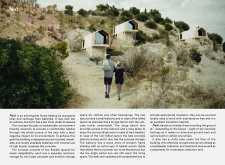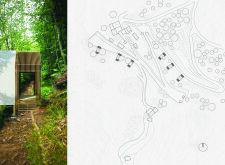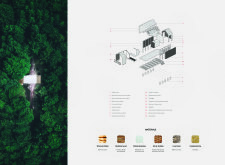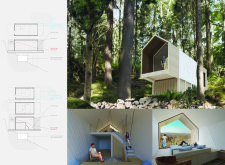5 key facts about this project
Nest is a modern design that focuses on sustainable living. Located in an area that values both comfort and environmental care, it serves as a new model for housing. The design emphasizes creating a space that promotes relaxation while reducing its ecological footprint. With flexible layouts and efficient use of space, it addresses the needs of contemporary residents.
Layout and Functionality
The design features two adaptable layouts that cater to different occupant needs. Each layout includes a separate restroom, along with storage areas for personal belongings. This setup enables efficient movement within a compact environment, allowing users to navigate their daily routines with ease.
Connection to Outdoor Spaces
Balconies are integral to both layouts, enhancing the link between indoor and outdoor living. In the lofted design, the staircase provides access to the balcony, and there is a lounge area underneath that serves storage purposes. The non-lofted version allows direct access to the balcony from the bed, fostering an open feeling that encourages occupants to enjoy the outdoors, even in less favorable weather.
Sustainable Material Choices
Material selection is essential in this design, particularly with the use of compressed hay for wall insulation. This choice reflects a commitment to using locally sourced, renewable materials that have a minimal environmental impact. Compressed hay offers effective thermal performance and requires little maintenance, aligning with the focus on sustainability.
Structural Considerations
The structure is supported by a timber frame anchored to concrete footings. This design choice allows the building to adapt to various terrain types without requiring extensive ground preparation. Beneath the living area, a utility space is designed for wastewater collection and treatment, along with a system for collecting rainwater. This integration of features supports sustainable living.
The balcony incorporates a shading system with a wooden frame and an additional layer of basket-woven shade. This design effectively controls the amount of sunlight that enters the living space, helping to regulate temperature and improve comfort all year round.






















































